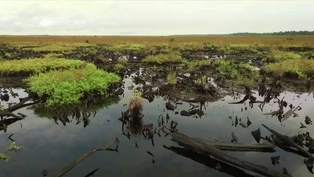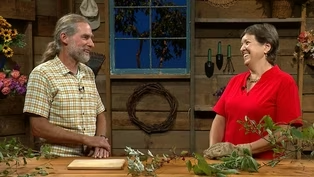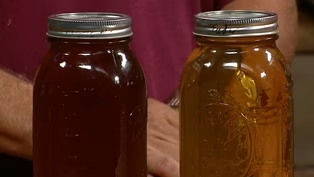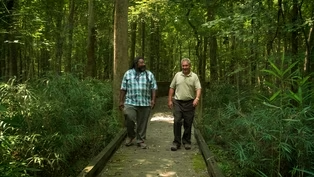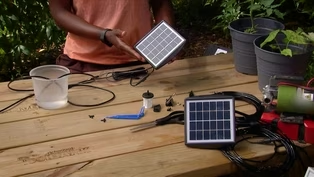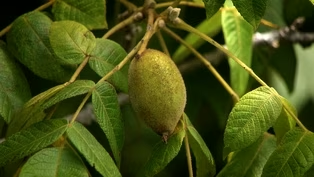Virginia Home Grown
Pollinator gardens
Clip: Season 23 Episode 6 | 2m 45sVideo has Closed Captions
Healthy habitats start by supporting insect life
Dr. Robyn Puffenbarger explains how pollinator gardens create good habitat for insects in the landscape which can help support insects, birds, mammals, and other animals. Even a small number of native plants can make a difference. Featured on VHG episode 2306; August 2023.
Problems playing video? | Closed Captioning Feedback
Problems playing video? | Closed Captioning Feedback
Virginia Home Grown is a local public television program presented by VPM
Virginia Home Grown
Pollinator gardens
Clip: Season 23 Episode 6 | 2m 45sVideo has Closed Captions
Dr. Robyn Puffenbarger explains how pollinator gardens create good habitat for insects in the landscape which can help support insects, birds, mammals, and other animals. Even a small number of native plants can make a difference. Featured on VHG episode 2306; August 2023.
Problems playing video? | Closed Captioning Feedback
How to Watch Virginia Home Grown
Virginia Home Grown is available to stream on pbs.org and the free PBS App, available on iPhone, Apple TV, Android TV, Android smartphones, Amazon Fire TV, Amazon Fire Tablet, Roku, Samsung Smart TV, and Vizio.
Providing Support for PBS.org
Learn Moreabout PBS online sponsorship(bright music) >>Big-picture conservation needs to always start at the base level with your plants.
If you have the right habitat with your plants, then you can bring in insects, animals like birds, reptiles, amphibians, and mammals.
One of the ways you can start is with a simple pollinator garden, and we're here at Staunton, Virginia in Montgomery Hall Park where they are trying to provide the right plants to conserve the insects and build habitat as part of an ecosystem.
One of the plants featured in this garden is hoary mountain mint, a very easy plant to find and grow in your garden.
You can even plant it directly in your lawn or with fescue grass, and it will compete against that very well, growing into a nice, mounded plant that will expand over time, providing the habitat for the insects.
The plant grows very nicely with these nice, green leaves.
This is where it gets its hoary name, the hoary white, and then has these nice, light purple flowers where the insects will land for their pollination.
It's a very easy plant to find and grow.
And in this garden, we also have some other nice natives, including wild basil, yarrow, the Rudbeckias, or black-eyed brown-eyed Susan complex, and whorled rosinweed, another nice, yellow flower that blooms a little later in the summer.
As you start to look and think about what you'd like to conserve, think about the plants that will build your ecosystem.
You can then get the seeds locally or the plants from a native nursery.
Local nurseries and native plant nurseries really have changed over the last few decades and constantly think about the ethics of where they source their material.
If you're concerned at all, just ask your local nursery provider where they get their seeds and plants, and they will explain how they use best practices.
That is just standard operating procedure now in most native plant nurseries.
Also, sometimes you can find a friend who might have some plants or seeds to share.
Just make sure before you take anything from someone else's property that you get permission for the seeds or for the plants.
So as you think about what you'd like to conserve in your garden, whether it's birds, reptiles, amphibians, or insects, think about what plants you can add to provide the ecosystem that they need to grow and thrive.
Video has Closed Captions
Clip: S23 Ep6 | 26m 46s | Discover unique plants and ecosystems being protected in Virginia! (26m 46s)
Video has Closed Captions
Clip: S23 Ep6 | 6m 31s | Discover features that help invasive plants spread (6m 31s)
Video has Closed Captions
Clip: S23 Ep6 | 6m 48s | Conservation in the heart of the swamp (6m 48s)
Great Dismal Swamp National Wildlife Refuge
Video has Closed Captions
Clip: S23 Ep6 | 7m 53s | Tour a forested wetland ecosystem and learn how it is managed (7m 53s)
Video has Closed Captions
Clip: S23 Ep6 | 2m 14s | Use solar power to save electricity and keep your plants watered (2m 14s)
Video has Closed Captions
Clip: S23 Ep6 | 8m 22s | Learn about conservation of a rare tree and research on rebuilding forests (8m 22s)
Providing Support for PBS.org
Learn Moreabout PBS online sponsorship

- Home and How To

Hit the road in a classic car for a tour through Great Britain with two antiques experts.












Support for PBS provided by:
Virginia Home Grown is a local public television program presented by VPM
